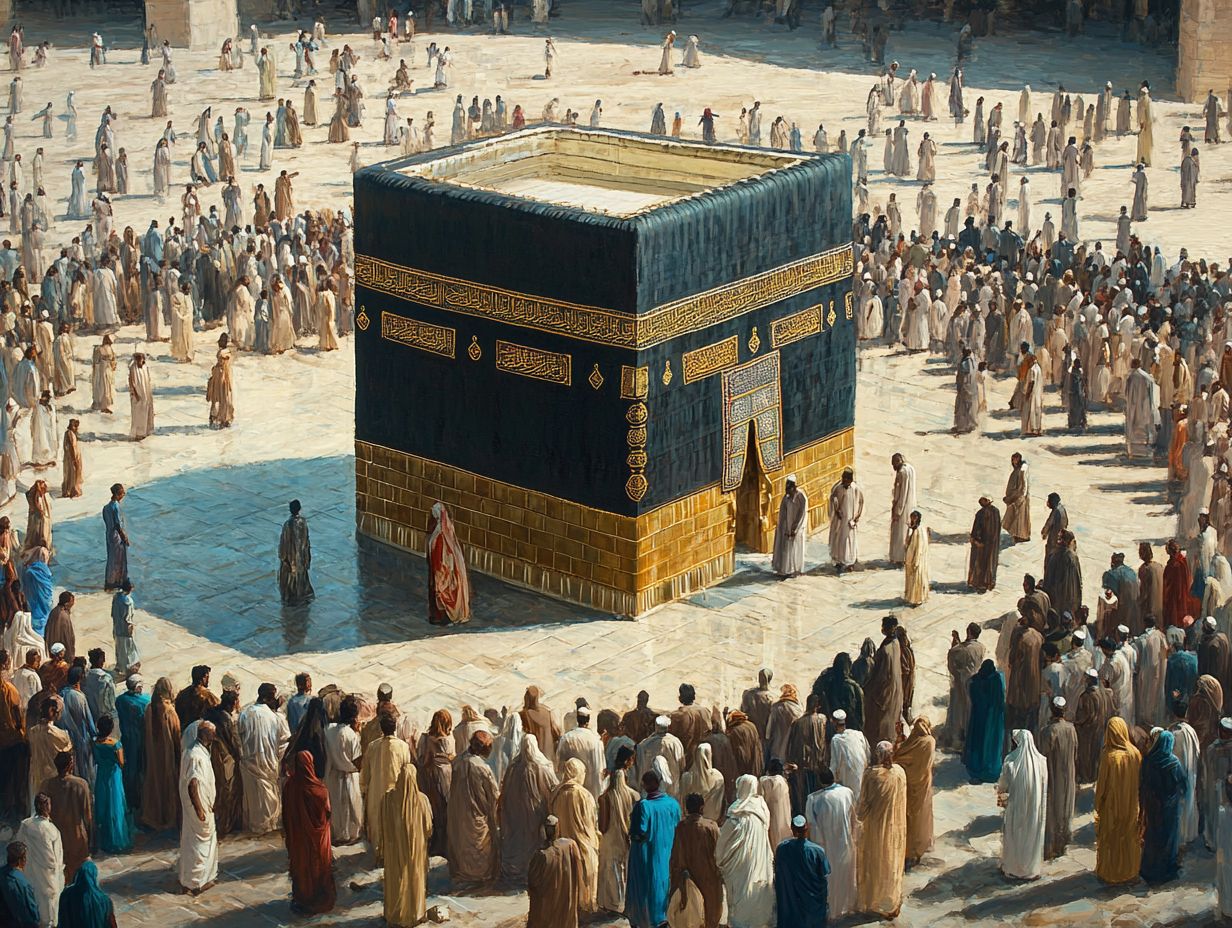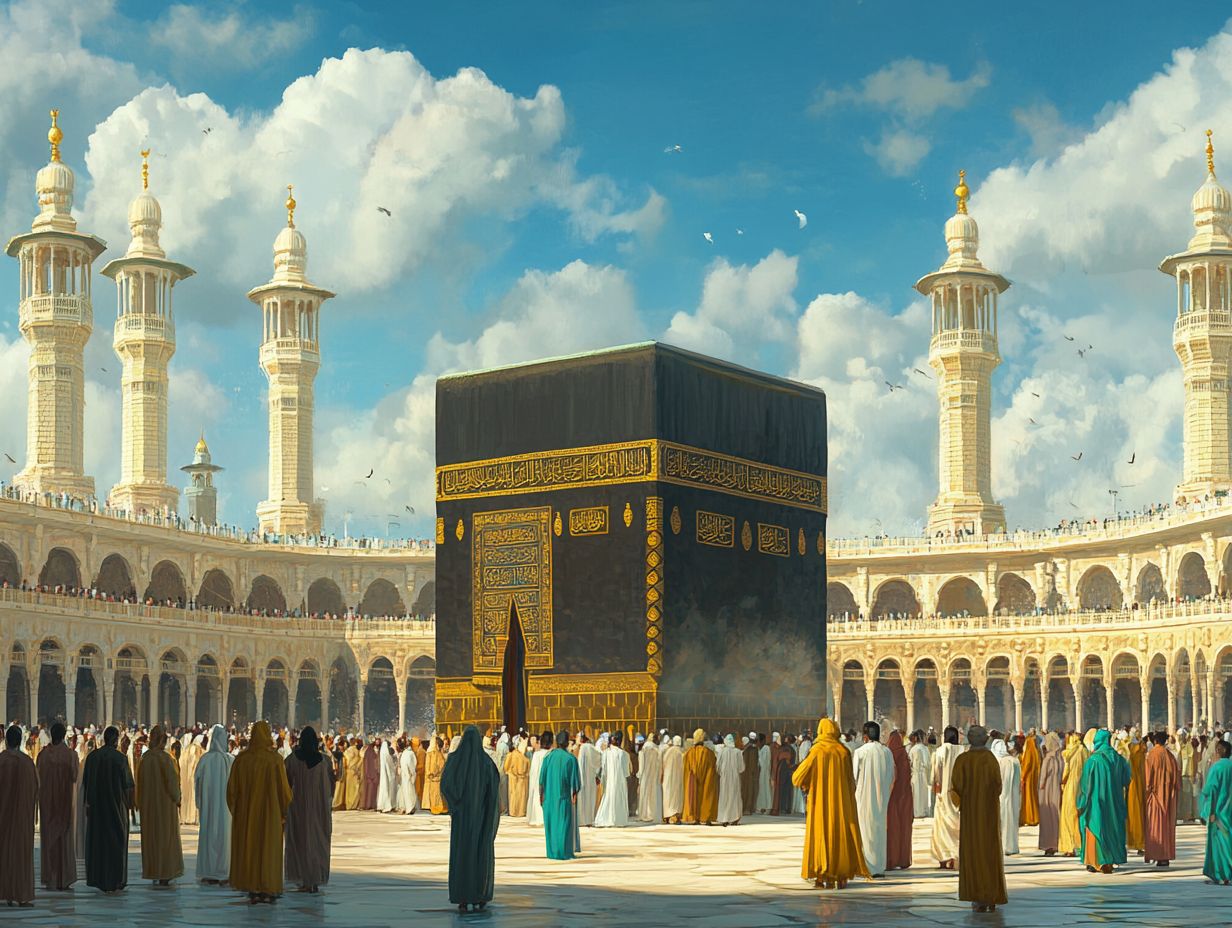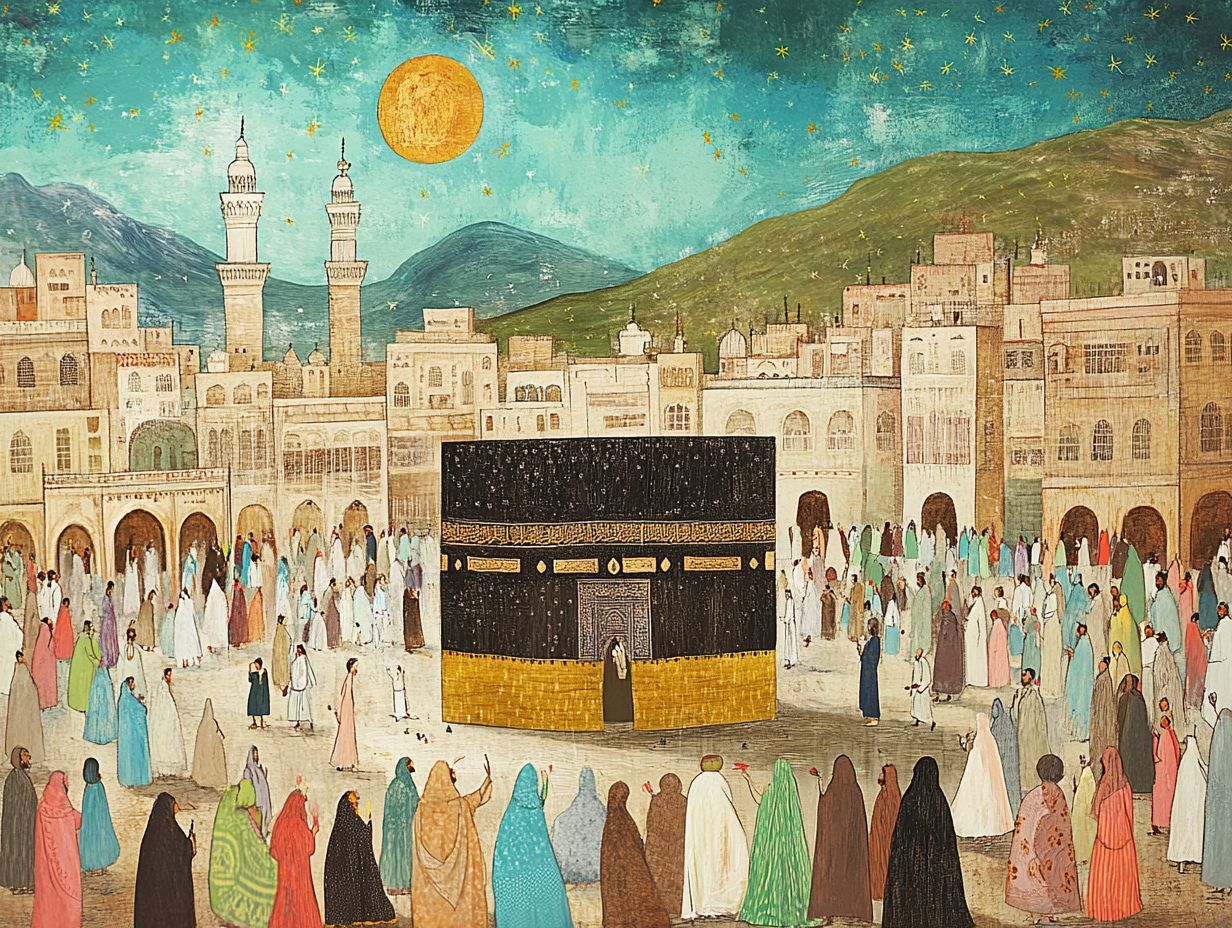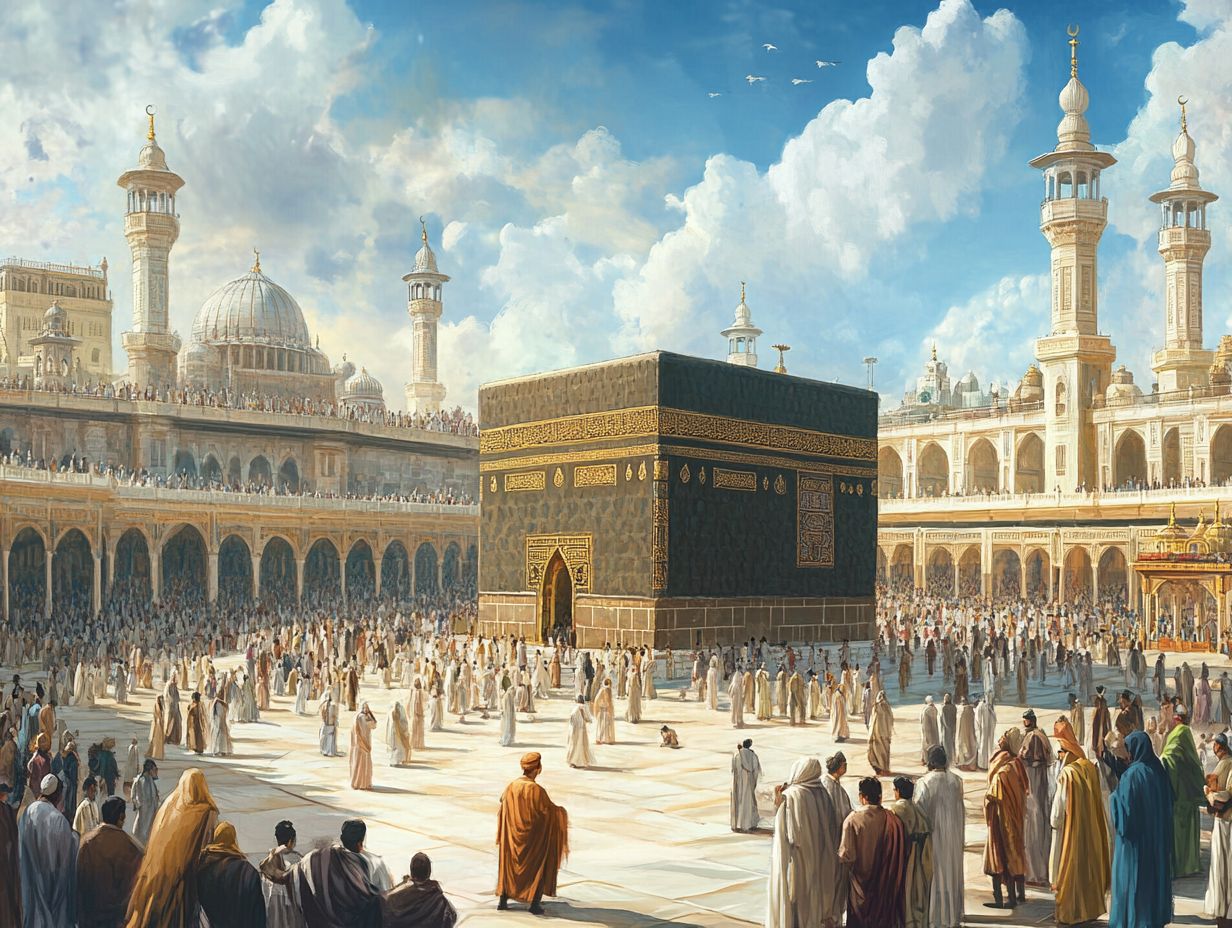Is Kaaba Related to Hinduism?
The Kaaba, a venerated edifice at the heart of Mecca, possesses profound significance in Islam, serving as the epicenter of pilgrimage and prayer. Its fascinating historical and cultural ties to Hinduism provoke thought-provoking inquiries into the shared elements of faith and spirituality.
This article investigates the Kaaba’s importance, delves into its rich historical narrative, and scrutinizes potential connections to Hindu beliefs and practices, including aspects of Sanatan Dharma. It considers whether the Kaaba is referenced in Hindu scriptures and explores the intriguing similarities between Islamic and Hindu rituals, pilgrimage routes, and spiritual practices.
Readers are invited to embark on a journey to uncover the intricate layers of connection that may exist between these two prominent world religions.
What is the Kaaba?

The Kaaba, situated at the core of the sacred city of Mecca, stands as one of the most venerated sites in Islam, attracting millions of pilgrims annually who come to engage in rituals central to their faith and spiritual teachings.
This hallowed edifice, a cube-shaped structure draped in black cloth, is traditionally believed to have been constructed by the prophets Ibrahim and Ismail. It embodies the essence of monotheism, symbolizing the unity of faiths within the Abrahamic traditions, and its role in the broader tapestry of religious history and beliefs.
Its rich historical backdrop and architectural significance elevate its status as a central hub for worship and spiritual connection in the Islamic world.
What is the Significance of the Kaaba in Islam?
The Kaaba possesses immense religious significance in Islam, serving as the Qibla, or the direction to which Muslims around the globe orient themselves during prayer.
This iconic edifice, referenced in the Quran, symbolizes the unity of faiths, uniting diverse Muslim communities in their spiritual practices and beliefs.
Annually, millions embark on the sacred journey of Hajj, a pilgrimage mandated by Islamic teachings, further solidifying the Kaaba’s status as a crucial site for worship and contemplation.
What is the History of the Kaaba?
The history of the Kaaba is intricately woven into the narratives of various prophets, notably Ibrahim and Ismail, who are believed to have constructed this revered edifice as a temple dedicated to the worship of the one true God. Throughout the centuries, the Kaaba has borne witness to numerous historical events that have shaped its religious significance within the broader tapestry of Abrahamic faiths.
It has evolved from an ancient sacred site into a central pillar of Islamic faith and practice. The architectural transformations it has undergone and the rituals associated with it reflect a dynamic interplay between history, monotheism, and spirituality, illustrating its significance in interfaith relations and comparative spirituality.
The origins of the Kaaba extend back to pre-Islamic times, when it served as a venerated shrine for various tribes across the Arabian Peninsula. Key figures, including the Prophet Muhammad, have played pivotal roles in its sanctification, particularly during the Farewell Pilgrimage, where he underscored its unifying role within the Muslim community and its spiritual significance in theistic belief systems.
The annual Hajj pilgrimage further emphasizes its significance, attracting millions of devotees who partake in rituals passed down through generations. This reinforces the Kaaba’s status not merely as a physical structure but as a profound symbol of unity, devotion, and religious symbolism among believers across diverse faiths.
What is the Connection between the Kaaba and Hinduism?
The connection between the Kaaba and Hinduism presents a compelling opportunity for exploring interfaith dialogue and the shared beliefs that connect these two prominent world religions, highlighting the potential for religious syncretism and cultural intersections.
While the Kaaba serves as a pivotal element of Islamic worship, it is crucial to consider the historical interactions, cultural exchanges, and religious anthropology that may have shaped the spiritual practices of both faith communities.
A deeper examination of the theological concepts, worship rituals, and comparative religion reveals the Kaaba’s significance within the broader tapestry of cultural heritage, highlighting the themes of unity and diversity that resonate throughout human history.
Is the Kaaba Mentioned in Hindu Scriptures?
While the Kaaba is predominantly linked to Islamic tradition, some scholars propose that ancient texts and narratives within Hindu scriptures may contain subtle references that allude to its significance within a broader cultural framework.
The Vedas, esteemed as foundational texts in Hinduism, encapsulate spiritual teachings and cosmological concepts that, upon closer examination, can unveil fascinating historical connections between the sacred site of the Kaaba and Hindu beliefs. This inquiry invites a deeper comprehension of how sacred symbols transcend individual faiths, weaving together a rich tapestry of shared spirituality, historical influences, and sacred history.
By engaging with diverse interpretations and commentaries on the Vedas, one may discover resonant parallels with the architectural and theological dimensions of the Kaaba. The dialogues surrounding cosmic order and pilgrimage evident in these ancient texts can provoke thoughtful reflections on the Kaaba s role as a focal point of worship, unity, and cross-cultural exchanges among various cultures.
Scholars assert that by investigating such references, followers of different faiths may uncover common ground, illuminating the dynamic interplay between spirituality and cultural identity. This exploration not only enhances religious discourse but also emphasizes the universal quest for understanding the divine that spans multiple traditions and theistic belief systems.
Do Hindus Worship the Kaaba?

The concept of Hindu worship at the Kaaba remains largely unrecognized, as the Kaaba serves primarily as a focal point of Islamic devotion and pilgrimage. Both Hindu and Islamic traditions encompass a diverse array of worship practices, and diving into this theme reveals the intricate dynamics of faith communities and their rituals.
Although Hindus do not typically incorporate the Kaaba into their religious observances, a broader understanding of worship rituals and comparative spirituality can shed light on the spiritual journeys undertaken by adherents of different faiths.
This distinction primarily stems from the differing theological frameworks that underpin each religion. Hindus celebrate a rich pantheon of deities and engage in various forms of puja, which include offerings and prayers at temples. In contrast, Muslims center their worship around the Five Pillars, with the Kaaba serving as the Qibla during Salah, emphasizing the core tenets of monotheism and collective devotion.
The rituals performed at the Kaaba, such as Tawaf where devotees circumambulate the structure highlight a profound sense of communal identity and submission to the divine within Islam. This stands in contrast to Hindu practices that emphasize personal devotion across a multitude of sacred spaces.
These differences not only illustrate the unique spiritual expressions inherent in each tradition but also reflect the diverse ways in which both faiths navigate their respective paths toward comprehending the divine and the moral teachings inherent within their spiritual practices.
Are there Similarities between Hindu and Islamic Practices at the Kaaba?
While the Kaaba stands as a distinctly Islamic site, a comparative analysis uncovers intriguing similarities in the practices and rituals of worship between Hinduism and Islam, particularly in the realm of pilgrimage.
Both traditions underscore the importance of sacred journeys and the performance of rites that cultivate a sense of community and spirituality among their adherents. The ritual of circumambulation, exemplified by Tawaaf in Islam, finds its parallel in Hindu practices surrounding their temples, highlighting a shared human inclination toward reverence, devotion, and sacred geography.
In both religions, pilgrimage emerges as a profound expression of faith, inspiring individuals to rise above the mundane aspects of daily life in search of a deeper spiritual connection. The journey to Mecca is thoughtfully mirrored by the sacred pilgrimage to sites like Varanasi, where worshippers aspire to attain purification, enlightenment, and the divine presence.
Each tradition fosters strong communal bonds, evident in the gatherings during significant festivals or pilgrimages that bring together diverse groups in shared celebration.
The rituals conducted at these venerated sites evoke a profound sense of belonging and identity, emphasizing universal themes of yearning and devotion that resonate across cultures and religions, contributing to a broader understanding of sacredness and human spirituality.
What is the Evidence of Hindu Influence on the Kaaba?
The inquiry into the possible Hindu influence on the Kaaba invites a fascinating examination of historical interactions and the cross-cultural exchanges that might have contributed to the development of this venerated site. Scholars have diligently analyzed a range of historical texts and archaeological discoveries, revealing a nuanced interplay of beliefs and practices among ancient civilizations.
This dynamic exchange has likely positioned the Kaaba as a pivotal center of worship within a rich tapestry of spirituality. Delving into these connections not only enriches the discourse surrounding the Kaaba but also enhances the understanding of its significance within the broader context of religious history and cultural heritage.
Are there Hindu Symbols or Inscriptions on the Kaaba?
The potential existence of Hindu symbols or inscriptions on the Kaaba has ignited a spirited debate among scholars and religious historians, prompting thorough investigations into these sacred symbols that may reveal an intriguing convergence of spiritual traditions, cultural heritage, and religious symbolism.
While the Kaaba is primarily recognized as an Islamic site, any discoveries of inscriptions or symbols indicative of Hindu beliefs could significantly enrich the understanding of interfaith dialogue, religious tolerance, and cultural syncretism between these two religions.
Such explorations provide valuable insights into the intricate nature of religious symbolism, spirituality, and its profound impact on shaping the identities of diverse faith communities.
This inquiry not only enhances the discourse surrounding the historical significance and cultural heritage of the Kaaba but also encourages a broader contemplation of how various faiths can discover common ground.
The presence of Hindu symbols, if substantiated, could signify a connection between the two faiths that transcends centuries of divergence. It raises thought-provoking questions about the shared narratives that influence human spirituality and challenges the preconceived notions held by adherents of both traditions.
As scholars immerse themselves in ancient texts, art, and architecture, they continue to unravel the intricate tapestry of cultural exchange, reinforcing the notion that, despite their distinct beliefs, many religions may harbor a rich interplay of ideas that promote mutual respect, religious tolerance, and understanding.
Is there a Hindu Temple Near the Kaaba?
The presence of a Hindu temple near the Kaaba has captured attention, prompting inquiries into the historical coexistence of various faiths in close proximity. While evidence of a confirmed Hindu temple immediately adjacent to the Kaaba remains elusive, the exploration of sacred sites surrounding Mecca offers valuable insights into the historical context of religious practices and the complex relationships among diverse faith communities.
This investigation into pilgrimage routes and sacred spaces fosters a deeper appreciation for shared spirituality amidst differing religious traditions.
The historical tapestry of the region reveals a rich interplay of influences from various cultures and religions, where multiple faiths once flourished side by side. Pilgrimage routes linking Mecca to other significant spiritual centers suggest a broader acceptance and interaction among religions, potentially including Hinduism.
By diving into ancient texts, traveler accounts, and the Quran, one can uncover the ramifications of these interactions, enriching the discourse on how sacred sites serve as points of convergence and mutual respect in the sacred landscape of the Arabian Peninsula.
Are there Similarities between the Kaaba and Hindu Temples?

An exploration of the similarities between the Kaaba and Hindu temples reveals intriguing insights into the architectural significance and religious practices that define these revered spaces. Despite the distinct foundational beliefs and functions inherent to each, both the Kaaba and Hindu temples serve as vital focal points for worship, embodying the concept of a sacred journey toward divinity.
The architectural features and rituals associated with these sites highlight the shared human experience of pursuing spiritual connection through places of worship and spiritual practices.
In both traditions, pilgrimage plays a central role, emphasizing the importance of undertaking a physical journey to attain spiritual enlightenment. Pilgrims traverse vast distances to reach the Kaaba during Hajj, while journeys to various Hindu temples, such as those in Varanasi or the sacred sites of South India, evoke a similar devotion.
Each site whether it be the cubic structure of the Kaaba or the intricately carved pillars of a Hindu temple is meticulously designed to facilitate a transcendent experience, serving as a poignant reminder to devotees of their spiritual purpose and place of worship.
The rituals performed at these locations frequently include offerings and prayers that reinforce a profound connection to the divine, illustrating how architecture and worship intertwine in both distinct and meaningful ways. These rituals are deeply embedded in the spiritual teachings of their respective faiths.
What is the Perspective of Scholars on the Connection between the Kaaba and Hinduism?
Scholars examining the relationship between the Kaaba and Hinduism present a multitude of perspectives, critically assessing theological concepts, historical interactions, and cultural exchanges that might reveal the connections between these two significant faith traditions.
Through the lens of comparative religion studies, researchers explore the narratives, myths, and symbols that inform the beliefs of their adherents, including studies of the Quran and Vedas, thereby cultivating a richer understanding of how these sacred sites resonate within their distinct spiritual realms.
Such investigations play a vital role in the ongoing discourse surrounding interfaith dialogue and the collective heritage of humanity.
Is the Connection between the Kaaba and Hinduism Valid?
The validity of the connection between the Kaaba and Hinduism remains a subject of scholarly exploration, as researchers delve into historical records, religious texts, and cultural influences to determine the depth and nature of these associations. While some scholars advocate for a significant historical connection rooted in ancient practices, others urge caution, emphasizing the complexities of interfaith dynamics and the distinctive beliefs that characterize each religion, such as monotheism in Islam and the polytheistic aspects of Sanatan Dharma.
This investigation into their potential connection fosters a greater understanding and respect among different faith communities.
The discourse frequently reflects on shared elements of ritual and pilgrimage, illuminating the ways in which spiritual traditions may overlap or diverge. Advocates of a connection point to similar architectural features and the pilgrimage aspects inherent in both the Kaaba in Mecca and various sacred sites within Hinduism. Conversely, critics highlight the unique theological foundations that distinctly separate the practices and beliefs of Islam and Hinduism.
Through an examination of these arguments, one can gain insight into how cultural contexts shape perceptions of divinity and worship, inviting richer discussions about religious identity and inter-religious dialogue in an increasingly interconnected world.
What are the Different Theories Surrounding the Connection?
A multitude of theories has surfaced regarding the connection between the Kaaba and Hinduism, highlighting the intricate web of interfaith relationships and the historical contexts that inform these discussions. Some scholars suggest that the origins of the Kaaba may be traced back to shared ancient practices among various civilizations, while others explore the cultural exchanges facilitated by trade, migration, and globalization.
These theories not only illuminate the religious significance of the Kaaba but also underscore the necessity of examining different faith traditions through a comparative lens.
Researchers note that both the Kaaba and certain Hindu shrines demonstrate striking similarities in architectural styles and functions, implying a potential syncretism shaped by centuries of interaction among diverse cultures in the region. Historical accounts of pilgrimage practices in both religions reveal possible shared ritualistic elements, illustrating how enduring traditions can arise from the convergence of various beliefs over time, contributing to interfaith relations and cultural intersections.
This dialogue invites a broader conversation about spirituality, encouraging adherents to contemplate the intersections of their faiths while simultaneously recognizing the rich tapestry of human belief and divine presence that transcends geographical divides.
Frequently Asked Questions
Is Kaaba Related to Hinduism?

No, Kaaba is not related to Hinduism. Kaaba is a sacred site located in Mecca, Saudi Arabia, and is primarily associated with the Abrahamic religions of Islam, Christianity, and Judaism.
Is there any connection between Hinduism and Kaaba?
No, there is no direct connection between Hinduism and Kaaba. Hinduism is a polytheistic religion practiced mainly in India, while Kaaba is a sacred site in Islam.
Is there any mention of Kaaba in Hindu scriptures?
No, there is no mention of Kaaba in Hindu scriptures. The concept of Kaaba and its religious significance is exclusive to Islam and its holy book, the Quran.
Are there any similarities between Hinduism and Islam regarding Kaaba?
There are no significant similarities between Hinduism and Islam regarding Kaaba. Both religions have different beliefs, rituals, and practices associated with Kaaba.
Do Hindus visit Kaaba or perform any rituals there?
No, Hindus do not visit Kaaba or perform any rituals there. Kaaba is a sacred site for Muslims and only they are allowed to enter and perform their religious practices there.
Are there any Hindu temples or shrines near Kaaba?
No, there are no Hindu temples or shrines near Kaaba. Mecca is a predominantly Muslim city, and there are no Hindu communities or places of worship in the vicinity of Kaaba.
